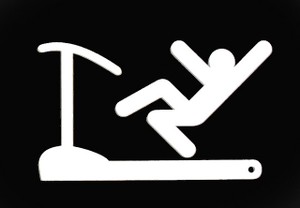You need to take care of yourself and getting sufficient daily exercise is an important aspect of healthy living – but for those at risk of or struggling with disordered eating, excessive exercise can serve as a another way to maintain rigid bodily self control, as a way to purge or as a way to severally restrict calorie gain.
Frighteningly, compulsive exercisers who do not yet have an ED are at an increased risk to develop one in conjunction with their excessive exercising.
Though normal exercise is essential for good health, compulsive exercise, especially by those also restricting calories or purging can have dangerous consequences, such as:
- Dehydration (purging bulimics may begin an intense exercise session already dehydrated from vomiting)
- Osteoporosis and an increased risk of bone fracture while exercising
- Heart problems and an increased resting heart rate
- Fatigue
- Reproductive problems and amenorrhea
- Joint, ligament and tendon damage from overtraining
- Depression and anxiety
- Muscle wasting
- Hormonal aletrations
- Insomnia
- Decreasing athletic performance1
- Damaged relationships, as your compulsion puts your need to exercise above the needs of those close to you
- Compulsive exercisers who do not have an eating disorder are at an increased risk to develop one
- Others
Are you exercising to control your health or does your need to exercise control you? Are you using exercise as a way to control your body and your moods? Does the way you exercise define you as a person?
Not sure if your exercise habits are excessive? Read the following 15 signs of unhealthy exercising and see if the descriptions below match the way you act and feel.
15 Signs That Your Exercise Habits Aren’t Healthy
- Feeling anxious, depressed or guilty when you can’t find the time to exercise on any given day
- Neglecting other responsibilities to find the time you need for excessive exercise
- Exercising as a way to control negative feelings
- Not wanting to exercise with others, because they may slow down your progress or intensity, however slightly
- Exercising even when sick or injured or exhausted2
- You wake up in the morning already thinking about the exercise you’ll do that day
- Friends and family members have expressed concern about how much you exercise
- You are obsessed about being or getting fat and use exercise as a way to control your body shape
- The way you exercise helps you to maintain your self esteem3
- Exercise isn’t something you do for fun – it’s an obligation that you have to fulfill each day4
- Working out for more than 2 hours a day
- Getting sick more often (as the immune system is degraded by physical exhaustion)
- Being preoccupied with fantasies about weight loss or body image
- Having trouble concentrating
- Ignoring messages from your body that tell you it’s time to stop – you instead soldier on to meet some arbitrary goal you have set for yourself
Better Strategies for Healthy Exercising
Think you may have a problem with compulsive exercising? Instead of grim marathon workouts each day, try to remember that exercise is supposed to be fun and it’s supposed to make you feel better after you do it…not worse.
If you recognize that you use exercise as a way to purge or severely restrict caloric gain then your life is at risk and you need to speak with your doctor or an eating disorder specialist about strategies for a healthy recovery. This is for real – eating disorders are the most lethal of all mental illnesses.
Strategies for Healthier, More Joyful Exercising
- Find exercise activities that you really enjoy and you’ll find yourself exercising because you want to and because it’s fun. You may not burn as many calories in an hour of hiking as you would in an hour running on the treadmill, but you’ll probably enjoy it more and want, not need, to do it again.
- Vary your exercise routine. Compulsive exercisers can get into a rut, focused on one or a few extreme workouts. To inject some fun into your workout routine and to lessen the compulsive nature of things, change things up occasionally, by trying new sports and activities.
- Don’t exercise when injured, sick or exhausted. Your body needs time and rest to heal, and if you can’t stop yourself when sick or injured, then you know you have a problem to overcome.
- Forget about ‘no pain no gain’…if you’re hurting then take a break or stop for the day!
- Exercise because it’s good for your health and for your mental well being and because it’s fun. These are reasons enough! Forget about calories and weight loss when considering exercise. You may find it easier to do this if you avoid fitness machines that measure calories burned, for example.
- Make sure you fuel your body. Eat enough varied foods to support the activities you engage in5
- References
Page last updated Sep 13, 2011


